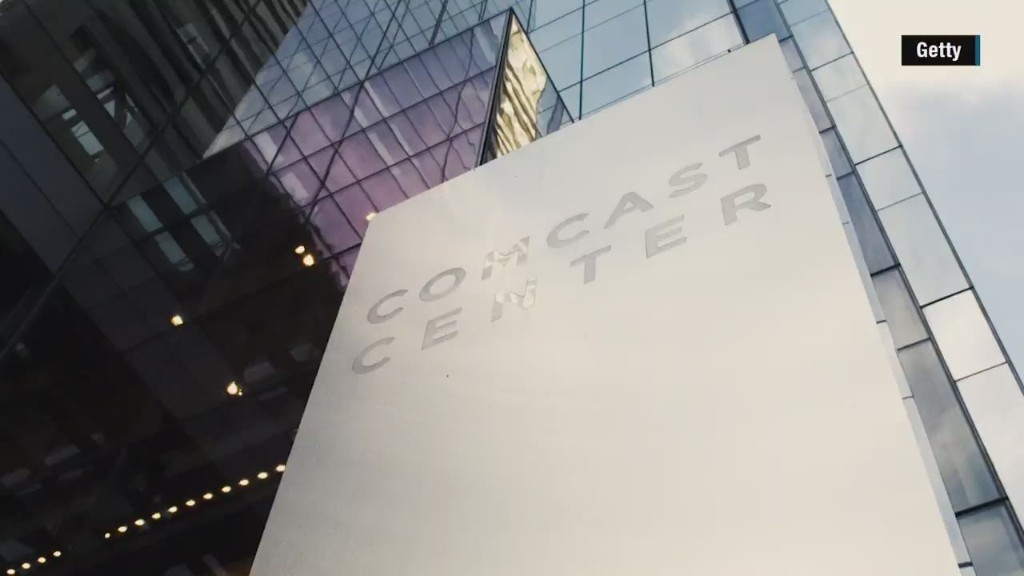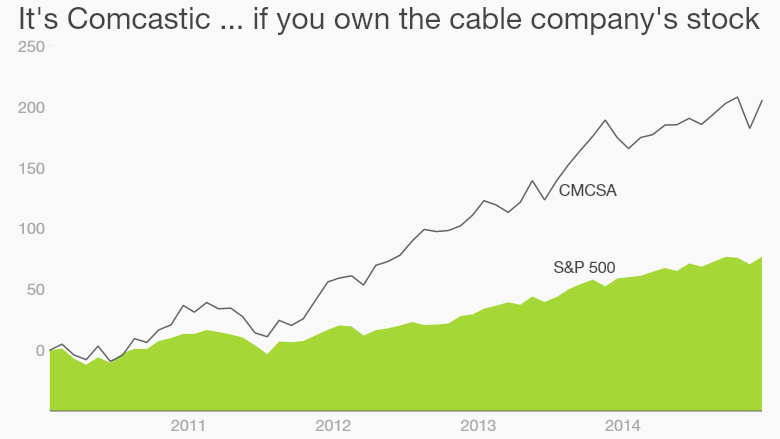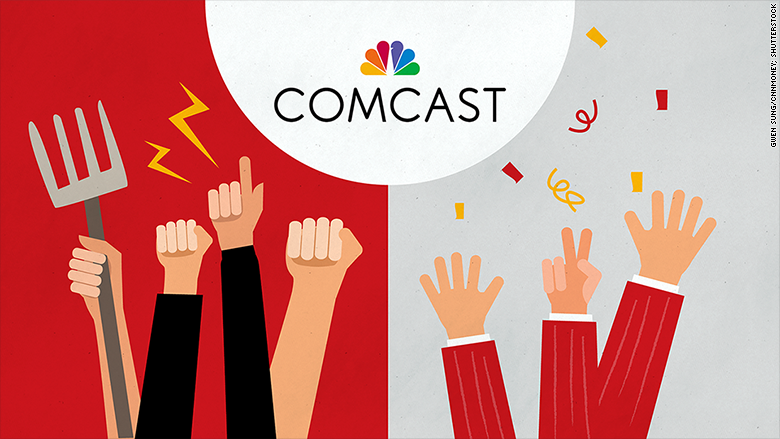
Is Comcast the worst company in America? Depends on whom you ask.
Consumers certainly despise the cable giant. Comcast was awarded the Golden Poo by readers of the Consumerist blog in 2014 -- the second time that Comcast "won" this title in the past five years.
You have to think that Comcast has a good chance of repeating this year given the recent stories about Comcast customers having their names changed to A--hole and Super B***h on bills.
There's also the customer service from hell phone call that went viral last summer -- the tale of tech blogger Ryan Block trying to cancel his cable service.
But investors aren't hoisting any pitchforks. They still adore Comcast (CMCSA). The stock has trounced the broader market over the past few years and is only about 3% below its all-time high.
That's despite the bad press about customer service, the NBC/Brian Williams saga and concerns about whether Comcast will be able to convince regulators to let it buy Time Warner Cable (TWC).

Here's why Wall Street is more in love with Comcast than the rest of us.
Not all cords are being cut. Sure, a lot of people boast about how they have ditched their expensive monthly cable plans. And that's partially true. Comcast is losing video subscribers.
But the company added more than 315,000 high-speed Internet subscribers in the third quarter. Comcast now has 21.6 million broadband subscribers.
Related: Why Disney earnings should scare every cable subscriber
So even if consumers are no longer watching traditional cable TV, many of them are still using Comcast to stream things like Netflix (NFLX).
"Look at the overall subscriber numbers," says Argus Research analyst Joe Bonner. "They're not bad."
Comcast will report its fourth quarter results on February 24. So it will be interesting to see if the company continues to add a lot more Internet subscribers.
NBC is a PR nightmare, but not a financial one. Comcast didn't plan on NBC becoming such a headache when it completed the deal to buy the entertainment assets of GE (GE) in 2013.
But even though the suspension of Brian Williams is continuing to be a big story for the mainstream press, it's unlikely to impact Comcast's bottom line all that much.
The NBC broadcast business only accounted for about 10% of Comcast's overall revenue in the third quarter. News is just a small portion of that.

The cable unit of NBCUniversal generates more revenue. And the NBCUniversal film studio and theme parks both throw off more cash flow than the Peacock Network.
"Brian Williams should not be a big concern for NBC from a financial standpoint," Bonner said. "It's more about prestige and perception than anything else."
Time Warner Cable deal may die, but that's okay. Comcast announced plans to acquire Time Warner Cable on February 13, 2014.
The deal, if approved, would drastically reshape the media world. AT&T (T) quickly countered with a move to buy DirecTV (DTV).
Related: Comcast and TWC hike modem fees. It's time to buy your own
But nearly a year after the Comcast-TWC announcement, it's unclear if the Federal Communications Commission and Department of Justice will give their blessing to the merger.
The FCC now has plans to regulate the Internet like a utility. And many consumer protectionist groups have expressed concerns about how a combined Comcast-TWC could lead to fewer choices for customers and slower broadband speeds.
"With the overlay of the populist uprising driving government policy, it is hard to imagine how regulators could approve the Comcast Time Warner Cable transaction at this point," wrote BTIG analyst Richard Greenfield in a blog post earlier this month.
Related: 4 bad things Internet companies can't do anymore if the FCC gets its way
But even if the deal gets killed, that may not be a big problem for Comcast.
Tom Eagan, an analyst with Telsey Advisory Group, says Time Warner Cable has more to lose than Comcast since Time Warner Cable's stock has soared due to the takeover.
Smaller cable company Charter Communications (CHTR) could also be in trouble since it has a side deal to acquire nearly 4 million subscribers from the combined Comcast-TWC if the deal is approved.
Eagan notes that if the FCC's proposal to regulate the Internet more like utilities gets the green light, the status quo may be more profitable for Comcast than becoming bigger and having to agree to more concessions.
"You could argue that if the Time Warner Cable deal fell through, Comcast's stock could go up," Eagan said.
That may not sit well with all the disgruntled Comcast customers out there.
But until the anger turns into a big wave of subscriber defections and a huge drop in the stock price, it's hard to imagine any big improvements for consumers anytime soon.


